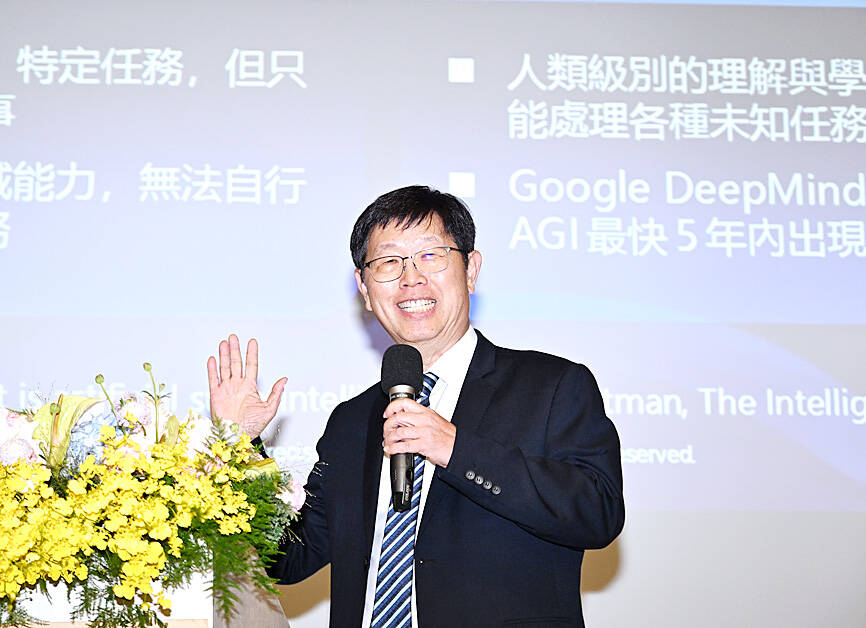Taiwan is an important base for the global development of artificial intelligence (AI) computing and technologies, Hon Hai Precision Industry Co (鴻海精密) chairman Young Liu (劉揚偉) said yesterday at an event organized by the Chinese National Federation of Industries (全國工業總會) in Taipei.
Taiwanese contract manufacturers accounted for 90 percent of the global AI server market, whereas Hon Hai, also known as Foxconn Technology Group (富士康科技集團), supplied at least 40 percent of the market to meet global demand for AI computing, Liu said.
Hon Hai’s AI product lineups cover graphics processing units, servers, and full system assembly and liquid-cooling solutions, he said.

Photo: Fang Pin-chao, Taipei Times
“One of the biggest advantages of Taiwan’s technology industry is its comprehensive supply chain, in which manufacturers can reach one another within one-and-a-half hours,” he said. “Other countries might have similar supply chains, but their factories are scattered across much larger regions than Taiwan.”
The US$500 billion Stargate Project, backed by OpenAI, Softbank Group Corp and Oracle Corp to build AI infrastructure in the US by 2029, coupled with other AI investments by global tech giants, presents a significant opportunity for Taiwan, Liu said, adding that he is confident in Taiwan’s prowess in AI sector.
Hon Hai’s development plans for the AI sector is comprised of four aspects: vertical integration of hardware and software, building AI data center industry chains, applying AI systems to corporate governance, and building generative-AI platforms for manufacturing, vehicles and cities, Liu said.
“We have discussed with many countries the issue of building AI data centers and related supply chains, and have talked with Minister of Economic Affairs J.W. Kuo (郭智輝) about helping our Taiwanese peers expand their businesses in these countries,” he said.
Hon Hai is also striving to develop smart manufacturing, smart electric vehicles (EVs) and smart cities based on generative AI technologies, following the company’s announcement last year that it would team up with Nvidia Corp to build an advanced computing center in Kaohsiung to support the initiatives, he said.
For the smart EV sector, the company plans to use over-the-air programming, generative AI-based engines and humanoid AI autonomous systems for vehicles, Liu said.
Analysts generally do not have a positive outlook for autonomous vehicle systems, as past development heavily relied on training using vast amounts of images, often leading to misjudgements in unfamiliar scenarios and resulting in accidents, he said.
“Now that generative AI systems are being applied to vehicles, they can intelligently identify each situation, so we believe humanoid AI autonomous systems should be adopted in the EV industry,” he added.
Talking to reporters after the event, Liu said that US President Donald Trump’s tariff policy would affect global trade, which in turn would also impact the company’s global operations.
As Hon Hai had planned its global deployment early, the effect would be relatively limited, he said.
Nevertheless, Liu said he supports the free flow of goods, adding that the best scenario would be an “open” one.

NEW IDENTITY: Known for its software, India has expanded into hardware, with its semiconductor industry growing from US$38bn in 2023 to US$45bn to US$50bn India on Saturday inaugurated its first semiconductor assembly and test facility, a milestone in the government’s push to reduce dependence on foreign chipmakers and stake a claim in a sector dominated by China. Indian Prime Minister Narendra Modi opened US firm Micron Technology Inc’s semiconductor assembly, test and packaging unit in his home state of Gujarat, hailing the “dawn of a new era” for India’s technology ambitions. “When young Indians look back in the future, they will see this decade as the turning point in our tech future,” Modi told the event, which was broadcast on his YouTube channel. The plant would convert

‘SEISMIC SHIFT’: The researcher forecast there would be about 1.1 billion mobile shipments this year, down from 1.26 billion the prior year and erasing years of gains The global smartphone market is expected to contract 12.9 percent this year due to the unprecedented memorychip shortage, marking “a crisis like no other,” researcher International Data Corp (IDC) said. The new forecast, a dramatic revision down from earlier estimates, gives the latest accounting of the ongoing memory crunch that is affecting every corner of the electronics industry. The demand for advanced memory to power artificial intelligence (AI) tasks has drained global supply until well into next year and jeopardizes the business model of many smartphone makers. IDC forecast about 1.1 billion mobile shipments this year, down from 1.26 billion the prior

People stand in a Pokemon store in Tokyo on Thursday. One of the world highest-grossing franchises is celebrated its 30th anniversary yesterday.

Zimbabwe’s ban on raw lithium exports is forcing Chinese miners to rethink their strategy, speeding up plans to process the metal locally instead of shipping it to China’s vast rechargeable battery industry. The country is Africa’s largest lithium producer and has one of the world’s largest reserves, according to the US Geological Survey (USGS). Zimbabwe already banned the export of lithium ore in 2022 and last year announced it would halt exports of lithium concentrates from January next year. However, on Wednesday it imposed the ban with immediate effect, leaving unclear what the lithium mining sector would do in the